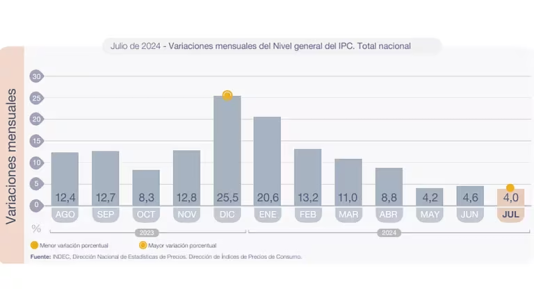All the Answers
Well-known member
The Government seeks to break the resistance of inflation and bring it to levels of 3% in September - Infobae

Source:

El Gobierno busca quebrar la resistencia de la inflación y llevarla a niveles de 3% en septiembre
Caputo dijo que se reunió con varias cámaras empresarias para que trasladen la reducción del impuesto PAIS a los precios al público. Mantener la tranquilidad cambiaria es clave para lograr ese objetivo
August 29, 2024
Caputo said he met with several business chambers to transfer the reduction of the PAIS tax to public prices. Maintaining exchange rate stability is key to achieving this goal.
By Pablo Wende

(NA)
One of the main reasons for the reduction of the PAIS tax, which begins on Monday 2, is to break the resistance of inflation, which is at a monthly level of 4%. The Minister of Economy himself acknowledged this in the last few hours, referring to the conversations he had with different sectors to transfer the reduction in the cost of imported inputs to the prices paid by consumers.
Luis Caputo opened the umbrella by acknowledging that in August the index could return to around 4%, which would be the fourth consecutive month that it remains at those levels. This month was influenced by the rise in tariffs and fuels, but also by a rebound in mass consumption items that would have occurred last week. The calm in the exchange rate would not have been enough to break through that floor.
That is why the official concern now is to break this inertia and for inflationary expectations to settle down one more step. The reduction of the PAIS tax from 17.5% to 7.5% should be fundamental to achieve this objective.
The challenge facing the government in terms of prices is not only to bring inflation down to 3% in September, but to keep it at those levels or even lower in the last quarter of the year. But seasonal issues and tariff increases could complicate that goal.
Some economists, such as Fernando Marull, believe that the rate could fall to levels close to 3%, a forecast shared by the economic team. This also explains why it was decided to lower the tax early in the month instead of waiting until the end of September, as was speculated among investors.
Beyond the expected rate increases, September is a month of low seasonality in terms of prices. The possible increase in bus fares due to the removal of subsidies by the Government for both the City and the Province of Buenos Aires could generate some pressure, although since it is a national index the impact could be diluted.
If this is successful, and inflation is actually reduced to values close to 3% in September, the next challenge would automatically be to maintain it at those levels until the end of the year. This does not seem like an easy task, because October could see new tariff increases and December is usually a month of greater pressure on prices.
Financial dollars and the exchange rate gap will also need to be closely monitored. As long as exchange rates remain stable or adjust downwards, it would greatly help to keep prices under control.

That is in fact the strategy chosen by Caputo, when he announced that he would sell part of the Central Bank's reserves to intervene in financial dollars. Although the objective is to absorb the excess pesos, at the same time the supply of foreign currency increases. This allowed the cash settlement and the MEP to remain below $1,300 during August.
Next month could also be favorable in this regard, since money laundering and subscription to the special regime for Personal Property could generate a greater supply of foreign currency. Therefore, it is not ruled out that exchange rates could fall to levels of $1,200.
This could also be helped by the fact that access to official foreign currency for the payment of imports is normalizing, which reduces demand from companies in the CCL.
“ I think that in September we will see a drop in prices. The reaction of all the sectors with which I met was very positive. We have met with many chambers that have committed to lowering prices. Everyone understands that a new model must be built together, speculation is useless,” said the Minister of Economy in a radio interview.

